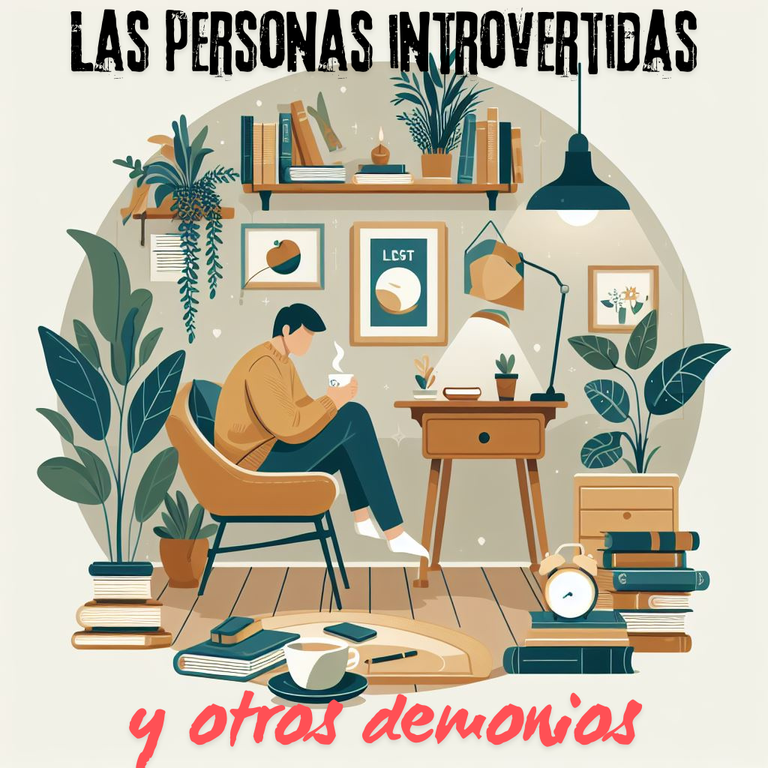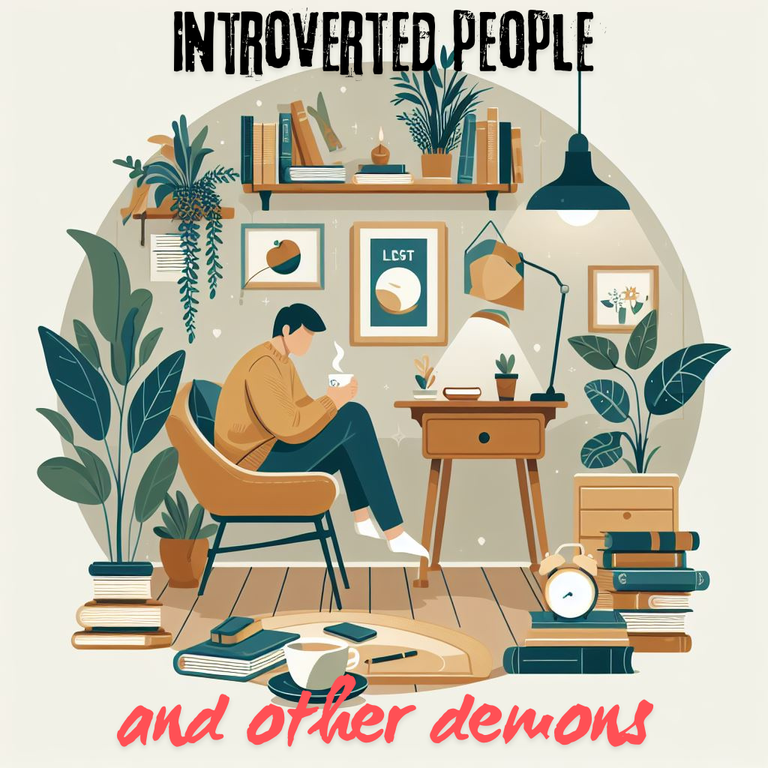
Si tuviera que hablar sobre personas que diariamente son violentadas de una forma normalizada tanto por profesionales como por quienes no lo son, sería de las personas introvertidas. Ellos y ellas son quienes diariamente tienen que, además de llevar un estilo de vida expuestos a situaciones incómodas -ya que la realidad nos demanda a todos y todas por igual-, soportar y aprender a lidiar con la recriminación de quienes los rodean por ser como son. O sea, me refiero a que tienen que soportar una carga enorme de presión cada día, mientras todos y todas, incluidas esas personas introvertidas, hemos asumido que está bien hacerlo, que es lo «correcto» y esperado. Pero, ¿por qué ocurre esto, ¿por qué hemos llegado a interiorizar que las personas introvertidas están mal solo por serlo?
Ocurre que la sociedad presume de los rasgos de extroversión sobre los de introversión, asociando los primeros al éxito social y los segundos a la psicopatología o a la falta de felicidad, salud mental o personalidades endebles. Si bien es cierto que se puede observar que en muchas psicopatologías el retraimiento es un signo y un síntoma representativo de estas, no se puede decir que sean lo mismo ni que cumplan la misma función, y, al asumir algo así, se parte de mitos en los que a las personas introvertidas se les asocia cualidades bastante alejadas de la realidad. Por eso es importante conocer qué es o qué implica ser una persona introvertida.
¿Qué significa ser una persona introvertida?
Como siempre, intentar definir a un conjunto de personas bajo una misma categoría es un espejismo, un intento harto vanidoso ya que nadie tiene la capacidad de definir a nadie partiendo de marcos genéricos. Sin embargo, bajo esta advertencia se puede apelar a rasgos muy generales. En este sentido, las personas introvertidas son principalmente personas que disfrutan más los momentos y las actividades en solitario, pero también con un bajo número de personas con las que puedan tener vínculos consistentes establecidos con anterioridad. Ello no significa que estas personas no puedan o no quieran en algún momento compartir espacios o situaciones grupales de mayor envergadura, sino que simplemente no serán la mayoría de las ocasiones ni las preferidas. Se pudiera decir que las personas introvertidas no necesitan tanto del contacto social como el resto de personas, para hacer su vida cotidiana. Por eso, mientras una persona «extrovertida» pudiera necesitar generalmente estar en contacto con otros o estar en situaciones grupales porque de lo contrario no alcanzaría la satisfacción necesaria, una persona introvertida con solo un poco de contacto social le basta.
Lo hablado hasta aquí constituye el rasgo más característico de las personas introvertidas. Sin embargo, existen otros que se asocian pero que en mi criterio no tienen por qué ser privativos de estas personas. Me refiero al hecho de que generalmente lleven a cabo actividades más intelectuales o que tengan un mundo interior muy rico, que sean personas muy autorreflexivas o analíticas. Estas personas bien pueden llevar a cabo actividades manuales como artesanías u oficios sin necesidad de que sean actividades exclusivamente intelectuales, pero lo que marca la diferencia es que de cualquier forma, preferirán hacerlo aislados de los demás o manteniendo una distancia física o subjetiva lo suficientemente cómoda como para marcar un espacio personal ya sea en la casa o en una oficina. De igual forma, el mundo interior rico pudiera ser cierto al dedicar más tiempo a las actividades en solitario, ya que de cierta manera dedican más tiempo a explotar intereses propios, pero no necesariamente tiene por qué ser así, pues pudieran haber personas introvertidas que carezcan de intereses variados o con un pobre mundo interior por no haber sido socializados desde pequeños en ambientes que potenciaran precisamente estas esferas, como padres y madres que no les estimularan o lo hicieran de manera muy pobre. Eso sí, la inclinación al mundo interior rico o pobre, en vez de al exterior, va a ser lo más característico de la persona introvertida.
Si bien es cierto que el tiempo que se reservan para ellas mismas les pudiera permitir ser personas autorreflexivas o analíticas, realmente lo pueden ser en mayor o menor medida, porque ello también depende del desarrollo de las capacidades cognitivas o intelectuales de la persona, y no tanto de un rasgo personológico como lo es la introversión. Y aunque no se mencionó, es importante aclarar que no son necesariamente personas tímidas o ansiosas socialmente, porque ello está condicionado por inseguridades dadas por una historia de vida en la que la persona fue aprendiendo conductas de evitación como respuestas a estímulos sociales demasiado incómodos o desagradables, y aunque no está mal ser tímido, la introversión va más de lo volitivo, de lo motivacional, es una postura ante la vida, una forma de ser y estar en el mundo, justo como lo puede ser cualquier otra.

Por tanto, para definirlas como para comprenderlas a las personas introvertidas, es necesario separarse del mito y del estereotipo. Las personas introvertidas son simplemente personas a las que les interesa más su mundo interno, sus propios intereses, mientras no tanto así con el mundo exterior y con las relaciones sociales. El resto de características son precisamente eso: generalidades, pero no por ello son distintivas de estas personas que son igual de diversas y únicas. Siempre, lo que va a marcar a una persona introvertida, será su mayor interés por su propio mundo en detrimento de la actividad social o en grupo.
La cuestión de por qué estamos acostumbrados a asociar introversión con lo patológico o el fracaso social.
Como decía anteriormente, aceptamos con normalidad asociar extroversión con éxito social e introversión con fracaso igualmente social. Ello se debe, en mi criterio, a la globalización de un sistema capitalista consumista que premia el salir de fiesta, tener muchos vínculos sociales, ser líderes, destacar en cualquier actividad que hagamos, ser proactivos, resilientes, entusiastas, fitness, positivos, saludables, etc., una lista enorme de cualidades en las que, si no encajamos o no lo hacemos de la forma que se debe, pues automáticamente algo está mal con nosotros. Y al mismo tiempo que la sociedad y la cultura nos demanda ser todo lo anterior, nos bombardea con objetos de consumo fetichistas y que nos empuja a la angustia de nunca ser suficiente y de siempre necesitar más. Esta es una cuestión sobre la que he hablado anteriormente, pero lo importante es ver cómo intencionalmente todo esto se asocia al éxito, y por ende, las personas que no cumplen con ello están mal y merecen ser arregladas o cuestionadas.
Es así cómo en cualquier espacio social, desde el centro laboral hasta la familia misma, nos encontramos con prejuicios y señalamientos hacia las personas introvertidas. Prejuicios que van desde asumir que las personas introvertidas son infelices o personas amargadas, pasando por verlas como personas fracasadas socialmente, hasta suponer rasgos patológicos como la depresión. Lo que sucede es que por lo general asociamos lo diferente con lo negativo: lo que difiere de nosotros o de lo que tenemos concebido, pues está mal, y como las personas introvertidas se salen del marco o del modelo social de éxito al que estamos acostumbrados, entonces les atribuimos el signo de lo negativo y las estigmatizamos porque así funcionan nuestros sesgos personales.
Una resignificación necesaria
Es por ello que necesitamos como sociedad, comprender y terminar de asumir que el éxito no lo es per se, sino que existen personas exitosas y ello depende de muchísimas cuestiones por las que se hace imposible reducirlo simplemente a lo hollywoodense. ¿Se imaginan lo desgastante que es pasarse la vida queriendo ser un empresario exitoso, y más aún, cuando todos y todas vivimos en contextos totalmente diferentes? Es por eso que el éxito no puede ser uno solo, sino que debe y tiene que estar definido en dependencia de las categorías que impactan en cada uno de nosotros y nosotras. Categorías como nuestro contexto de relaciones sociales, nuestras historias de vida, nuestros intereses, las oportunidades con las que contemos, nuestros proyectos futuros, nuestros propios rasgos personológicos, etc.
El éxito, de la forma en que debiera ser visto, pudiese verse expresado tanto en abrir un local propio de venta de manualidades, como escribir un libro, saldar la cuenta pendiente con nuestra salud mental yendo a terapia, terminar una carrera universitaria, visitar otros países, conseguir el trabajo que soñamos, encontrar la paz y tranquilidad en algo o en alguien, ver florecer las flores del jardín que con tanto empeño construiste, y de muchas otras formas más que no tienen que ser necesariamente tener dinero, una buena casa, familia y trabajo.

Logrando hacer esta resignificación del éxito, estaríamos resignificando lo que concebimos por personas introvertidas, porque estaríamos por fin asumiendo que porque no necesiten tanto del contacto social para vivir, no necesariamente tienen que estar rotas o enfermas, o necesitar ayuda. Es cierto que por naturaleza somos seres sociales, y que es un hecho que todos y todas necesitamos de los demás para vivir en sociedad, pero el foco nunca debe estar en qué medida lo hacemos expresamente, sino la función que ello cumple y el significado que le damos.
Para terminar...
Si eres una persona no introvertida, recuerda siempre que tú eres tú, y que los y las demás no tienen que igualmente ser tú, y que por tanto, tus propias concepciones, creencias y pensamientos sobre la realidad, son precisamente eso: tuyos, no de nadie más. Así que cuando conozcas a una persona introvertida, no la fuerces ni la llenes de presión empujándola a ser o hacer lo que no quiere ni ser ni hacer solo porque es lo que te han enseñado que lo «normal». Las personas introvertidas son, exactamente, personas, con una forma diferente a la tuya de ser y estar en el mundo, con sus propios intereses y aspiraciones, sintiéndose cómodas de la forma que son y, paradójicamente, solo necesitarán ayuda si tú los empiezas a violentar bajo tus propios estándares subjetivos intentando «salvarlas» de eso que tú mismo le estás provocando. Recuerda siempre que no eres un ser superior.
Si eres una persona introvertida, el camino nunca será fácil porque el mundo no está construido para personas como tú, pero con que te reconozcas diferente a lo que los demás esperan de ti es suficiente. Recuerda que no eres ellos ni tienes por qué sentirte mal por no cumplir con sus aspiraciones, al contrario, estás logrando algo que ellos mismo no pudieron al salirte del modelo industrial de producción en serie de personas. Respétate, y asume tu propia autoridad contigo misma como persona, sé fiel a tus sentimientos y vive de la forma que desees siempre y cuando no te hagas daño a ti ni se lo hagas a nadie. Tu autenticidad es de las cosas más bonitas que tienes.
English version

If I had to talk about people who are daily violated in a normalized way by professionals and non-professionals alike, it would be introverts. They are the ones who daily have to, in addition to leading a lifestyle exposed to uncomfortable situations -since reality demands all of us equally-, endure and learn to deal with the recrimination of those around them for being the way they are. In other words, I mean that they have to bear an enormous burden of pressure every day, while all of us, including those introverted people, have assumed that it is okay to do so, that it is the "right" and expected thing to do. But why does this happen, why have we come to internalize that introverted people are wrong just for being introverted?
It happens that society presumes extroversion traits over introversion traits, associating the former with social success and the latter with psychopathology or lack of happiness, mental health or weak personalities. Although it is true that it can be observed that in many psychopathologies withdrawal is a sign and a representative symptom of these, it cannot be said that they are the same nor that they fulfill the same function, and, in assuming something like this, it is based on myths in which introverted people are associated with qualities that are quite far from reality. That is why it is important to know what it is or what it implies to be an introvert.
What does it mean to be an introvert?
As always, trying to define a group of people under the same category is a mirage, a very vain attempt since no one has the ability to define anyone based on generic frameworks. However, under this caveat it is possible to appeal to very general traits. In this sense, introverted people are mainly people who enjoy more solitary moments and activities, but also with a low number of people with whom they may have previously established consistent bonds. This does not mean that these people cannot or will not want to share larger group spaces or situations at some point, but simply that they will not be the majority of the time or the preferred ones. It could be said that introverted people do not need as much social contact as the rest of people, to go about their daily lives. Therefore, while an "extroverted" person may generally need to be in contact with others or to be in group situations because otherwise he/she would not reach the necessary satisfaction, an introverted person with just a little social contact is enough.
What has been said so far constitutes the most characteristic trait of introverted people. However, there are others that are associated but that in my opinion do not have to be exclusive of these people. I am referring to the fact that they generally carry out more intellectual activities or that they have a very rich inner world, that they are very self-reflective or analytical people. These people may well carry out manual activities such as crafts or trades without the need for them to be exclusively intellectual activities, but what makes the difference is that either way, they will prefer to do so in isolation from others or by maintaining a physical or subjective distance comfortable enough to mark a personal space either at home or in an office. Similarly, the rich inner world could be true when dedicating more time to solitary activities, since in a certain way they dedicate more time to exploit their own interests, but it does not necessarily have to be so, since there could be introverted people who lack varied interests or with a poor inner world because they have not been socialized since they were young in environments that fostered precisely these spheres, such as fathers and mothers who did not stimulate them or did it in a very poor way. However, the inclination towards the rich or poor inner world, instead of the outer world, will be the most characteristic of the introvert.
Although it is true that the time they reserve for themselves could allow them to be self-reflective or analytical people, they really can be to a greater or lesser extent, because this also depends on the development of the cognitive or intellectual capacities of the person, and not so much on a personological trait such as introversion. And although it was not mentioned, it is important to clarify that they are not necessarily shy or socially anxious people, because this is conditioned by insecurities given by a history of life in which the person was learning avoidance behaviors as responses to social stimuli too uncomfortable or unpleasant, and although it is not wrong to be shy, introversion is more volitional, motivational, it is a position in life, a way of being and being in the world, just as it can be any other.

Therefore, both to define and to understand introverted people, it is necessary to separate from the myth and stereotype. Introverted people are simply people who are more interested in their inner world, their own interests, while not so much in the outside world and social relationships. The rest of the characteristics are just that: generalities, but they do not distinguish these people who are equally diverse and unique. Always, what will mark an introvert will be his or her greater interest in his or her own world to the detriment of social or group activity.
The question of why we are used to associate introversion with pathological or social failure.
As I said before, we accept with normality to associate extroversion with social success and introversion with social failure. This is due, in my opinion, to the globalization of a consumerist capitalist system that rewards going out partying, having many social links, being leaders, standing out in any activity we do, being proactive, resilient, enthusiastic. A huge list of qualities in which, if we do not fit or do not do it the way it should, then automatically something is wrong with us. And at the same time that society and culture demands us to be all of the above, it bombards us with fetishistic consumer objects and pushes us into the anguish of never being enough and always needing more. This is an issue I have talked about before, but the important thing is to see how intentionally all this is associated with success, and therefore, people who do not comply with it are bad and deserve to be fixed or questioned.
This is how in any social space, from the workplace to the family itself, we encounter prejudices and finger-pointing towards introverted people. These prejudices range from assuming that introverted people are unhappy or bitter, to seeing them as social failures, to assuming pathological traits such as depression. What happens is that we generally associate what is different with what is negative: what differs from us or from what we have conceived, is bad, and since introverted people are outside the framework or the social model of success to which we are accustomed, then we attribute to them the sign of the negative and stigmatize them because that is how our personal biases work.
A necessary resignification
That is why we need, as a society, to understand and finish assuming that success is not per se, but that there are successful people and that it depends on many issues that make it impossible to reduce it simply to Hollywood. Can you imagine how exhausting it is to spend your life wanting to be a successful entrepreneur, and even more, when we all live in totally different contexts? That is why success cannot be just one, but must and has to be defined depending on the categories that impact each one of us. Categories such as our context of social relationships, our life histories, our interests, the opportunities we have, our future projects, our own personal traits, etc.
Success, in the way it should be seen, could be expressed in opening a craft shop, writing a book, settling the pending account with our mental health by going to therapy, finishing a university degree, visiting other countries, getting the job we dream of, finding peace and tranquility in something or someone, seeing the flowers bloom in the garden you built with so much effort, and in many other ways that do not necessarily have to be having money, a good house, family and job.

By achieving this resignification of success, we would be resignifying what we conceive as introverted people, because we would finally be assuming that because they do not need so much social contact to live, they do not necessarily have to be broken or sick, or need help. It is true that by nature we are social beings, and that it is a fact that we all need others to live in society, but the focus should never be on the extent to which we do it expressly, but the function it fulfills and the meaning we give to it.
To conclude...
If you are a non-introvert, always remember that you are you, and that others do not have to be you as well, and that therefore your own conceptions, beliefs and thoughts about reality are just that: yours, not anyone else's. So when you meet an introvert, don't force them or put pressure on them by pushing them to be or do what they don't want to be or do just because that's what you've been taught is "normal". Introverted people are, exactly, people, with a different way of being and being in the world than you, with their own interests and aspirations, feeling comfortable the way they are and, paradoxically, they will only need help if you start to violate them under your own subjective standards trying to "save" them from what you yourself are provoking them to do. Always remember that you are not a superior being.
If you are an introvert, the road will never be easy because the world is not built for people like you, but if you recognize that you are different from what others expect from you, that is enough. Remember that you are not them nor do you have to feel bad for not fulfilling their aspirations, on the contrary, you are achieving something that they themselves could not by leaving the industrial model of mass production of people. Respect yourself, and assume your own authority with yourself as a person, be true to your feelings and live the way you want as long as you don't hurt yourself or anyone else. Your authenticity is one of the most beautiful things you have.

Créditos | Credits
Imágenes utilizadas | Images used
Todas las imágenes utilizadas son de mi propiedad y fueron generadas utilizando Copilot de Bing y editadas en Canva | All images used are my own property and were generated using Copilot from Bing and were edited using Canva.
Traducción | Translation
Te puede interesar | You may be interested in
El amor no lo puede todo | Love can't do everything [ES/EN]
El llanto como forma de validarnos | Crying as a way to validate ourselves [ES/EN]
¿Depresión de alto funcionamiento? | High-functioning depression? [ES/EN]
Sigamos hablando del autocuidado | Let's keep talking about self-care [ES/EN]
¿Las media naranjas ruedan? | Does half oranges roll? [ES/EN]
¿Conoces el «porno» de productividad? | Do you know about productivity "porn"? [ES/EN]


👌🏻👌🏻👌🏻